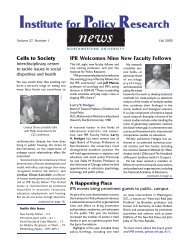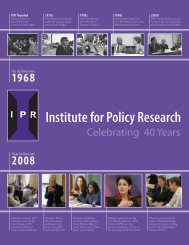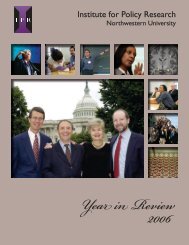Highlights of 2011 - Institute for Policy Research - Northwestern ...
Highlights of 2011 - Institute for Policy Research - Northwestern ...
Highlights of 2011 - Institute for Policy Research - Northwestern ...
Create successful ePaper yourself
Turn your PDF publications into a flip-book with our unique Google optimized e-Paper software.
Politics, Institutions, AND Public <strong>Policy</strong><br />
analysis, he said. Manski points to the United Kingdom, where<br />
agencies must state upper and lower bounds in assessing the<br />
budgetary impact <strong>of</strong> a legislative proposal. He also suggests that<br />
policy analysts and researchers use a layered analysis, to move<br />
from weak, highly credible assumptions to stronger, less credible<br />
ones, determining the conclusions that follow in each case.<br />
This would help resolve the tension between the credibility and<br />
power <strong>of</strong> assumptions and also improve the transparency <strong>of</strong><br />
policy discussions. The research project received funding from<br />
the National Science Foundation.<br />
The Politics <strong>of</strong> Motivation<br />
cognitive anchors <strong>for</strong> jurors in<br />
reaching their decisions on damages.<br />
Although these recommendations are likely to be influenced<br />
by the evidence presented at trial, no <strong>for</strong>mal constraints<br />
limit the amounts attorneys might suggest. One worry is that<br />
the recommendations can mislead jurors. Studying the deliberations<br />
<strong>of</strong> jurors in 31 cases involving 33 plaintiffs in which the<br />
jury awarded damages, Diamond and her colleagues found that<br />
jurors <strong>of</strong>ten perceive plaintiff ad damnums not only as irrelevant<br />
but also as outrageous, and they view defense damage<br />
suggestions as more legitimate estimates than plaintiff ad damnums.<br />
Together, these findings suggest that extreme plaintiff ad<br />
damnums might exert less unwarranted influence than critics<br />
fear. The article appeared in Empirical Legal Studies. Diamond is<br />
an IPR associate and Howard J. Trienens Pr<strong>of</strong>essor <strong>of</strong> Law.<br />
In their widely cited 2006 paper, “Motivated Skepticism in the<br />
Evaluation <strong>of</strong> Political Beliefs,” political scientists Charles Taber<br />
and Milton Lodge <strong>of</strong> Stony Brook University <strong>of</strong>fer a powerful<br />
case <strong>for</strong> the prevalence <strong>of</strong> directional reasoning that aims not<br />
at truth, but at vindicating prior opinions. Taber and Lodge’s<br />
results have far-reaching implications <strong>for</strong> empirical scholarship<br />
and normative theory. Indeed, the very citizens <strong>of</strong>ten seen as<br />
per<strong>for</strong>ming “best” on tests <strong>of</strong> political knowledge, sophistication,<br />
and ideological constraint appear to be those who are the<br />
most susceptible to directional reasoning. However, in a Critical<br />
Review article, Druckman points out that while Taber and<br />
Lodge’s study could be considered methodologically beyond<br />
reproach, it could also substantially overstate the presence <strong>of</strong><br />
motivated reasoning in political settings. That said, the focus on<br />
accuracy motivation has the potential to bring together two<br />
models <strong>of</strong> opinion <strong>for</strong>mation that many treat as competitors<br />
and to <strong>of</strong>fer a basis <strong>for</strong> assessing citizen competence.<br />
Jury Deliberations and Damage Anchors<br />
As part <strong>of</strong> her ongoing analysis <strong>of</strong> live jury deliberations in the<br />
Arizona Jury Project, law pr<strong>of</strong>essor<br />
and psychologist Shari<br />
Seidman Diamond and her colleagues<br />
recently assessed how<br />
juries arrive at a dollar amount in<br />
awarding damages. Jurors <strong>of</strong>ten<br />
cite determining the amount<br />
as one <strong>of</strong> the hardest aspects<br />
<strong>of</strong> the jury process. Many hardto-predict<br />
values such as future<br />
medical expenses or injuries<br />
that lack market values, such as<br />
pain and suffering, are difficult to<br />
translate into reasonable compensation.<br />
Attorneys are generally<br />
permitted to <strong>of</strong>fer recommendations<br />
<strong>for</strong> damage amounts,<br />
presenting potentially powerful<br />
Male/Female Differences and<br />
Similarities<br />
Evolutionary psychologists and feminist psychologists are<br />
locked in fierce debate over widely different interpretations<br />
<strong>of</strong> the causes <strong>of</strong> sex differences and similarities. IPR social<br />
psychologist Alice Eagly, James Padilla Chair <strong>of</strong> Arts and<br />
Sciences, and her colleague Wendy Wood <strong>of</strong> the University<br />
<strong>of</strong> Southern Cali<strong>for</strong>nia continue their investigation into this<br />
topic. In a special issue <strong>of</strong> Sex Roles devoted to the debate,<br />
the co-authors trace the source <strong>of</strong> the mutual distrust <strong>of</strong><br />
feminist and evolutionary psychologists and suggest that the<br />
two sides <strong>of</strong> the debate might be “mired in an old-fashioned<br />
nature versus nurture dynamic.” Eagly and Wood urge their<br />
colleagues to consider research by evolutionary scientists in<br />
a wider range <strong>of</strong> scientific domains—beyond the realm <strong>of</strong><br />
psychology. As an example, they explain how they came to<br />
develop their “biosocial constructionist” evolutionary theory,<br />
which integrates human culture in both ultimate and proximal<br />
causes <strong>of</strong> female and male behavior. Adequate theorizing<br />
requires that feminists acknowledge the distant evolutionary<br />
IPR social psychologist Alice Eagly introduces her co-author, University <strong>of</strong> Illinois at Chicago<br />
pr<strong>of</strong>essor Stephanie Riger, at a talk on how feminism has trans<strong>for</strong>med the science <strong>of</strong> psychology.<br />
47

















